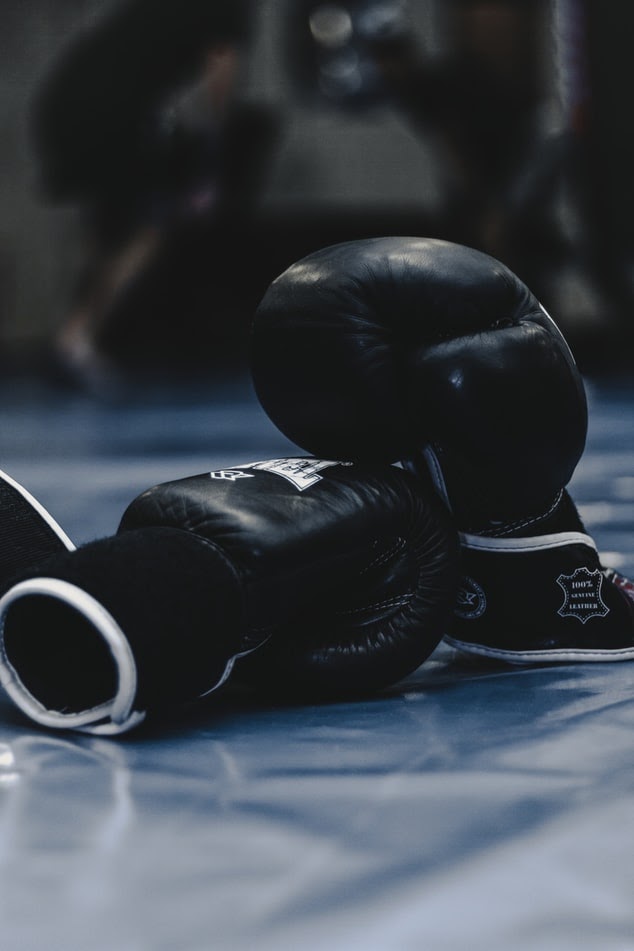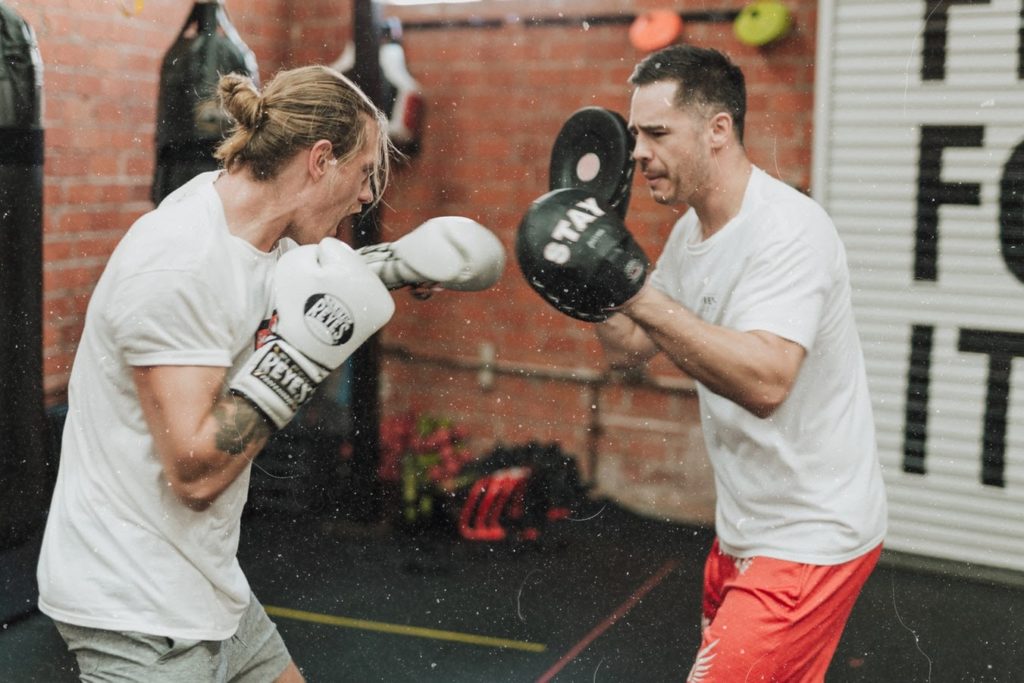Boxing at one time was second only to baseball as the most popular sport in America, and still counts millions of fans worldwide who pay millions of dollars to watch a top match. Boxing is an intense sport. There’s something primal about two opponents punching each other with gloved fists until one of them collapses or loses on points.

Anyone who saw Jose Luis Castillo fight Diego Corrales nonstop for 10 rounds can understand the allure and thrill of boxing.
It’s believed there are an estimated 6 ½ million boxers in the world, 22,000 of them fighting at the professional level. And all of them need trainers to reach their full potential in the sport.
Former pro fighter Sergio Martinez had this to say:
“Because the sport of boxing is beautiful. And the best sport on earth. (But it’s very dangerous.) If you do the right thing and you train properly, it’s much less risk than you normally would expect. And I have an adrenaline that makes me emotional.”
One-time middleweight champion Jake “Raging Bull” LaMotta said this about the sport:
“Lot of guys can take punches. The idea is not to take unnecessary punishment.”
Teaching boxers how to dodge punishment and dish it out, instead, is a key part of the job when you’re a private boxing coach. But perhaps the more important attributes involve being a great mentor and motivator to those who embrace this grueling sport. If you’ve spent some time in the ring and are now thinking about training future stars, read on to discover how you can become a certified private boxing coach.
In this article you’ll learn:
- How much money you can make as a private boxing instructor
- The required training and certifications
- Professional groups to join
- Employment Opportunities
- Finding boxers to teach as a private coach
- Plus helpful tips for private boxing coaches.
How much money can you make?
Private boxing coaches do very well. The average cost of a 60-minute boxing lesson is currently about $100. Costs vary depending on the coach’s experience, location and whether the lessons are for beginner, intermediate or top fighters. Private instructors around the country charge anywhere from $30 up to $195 per hour.
Training and Certification
Your first step is to join USA Boxing. The fee varies depending on where you live but averages $90 for a one-year membership. Actual boxing experience is essential if you expect trainees to take you seriously.
USA Boxing is the national governing body for Olympic-style boxing in the United States. USAB is recognized by the International Boxing Federation (AIBA) as the national organization that governs boxing in the United States. If you want to coach boxing, you must be certified by USA Boxing.

USA Boxing consists of 58 Local Boxing Committees throughout the country. Each LBC approves new clubs and sanctioned events within its own geographic area.
You can earn certification either by attending a clinic held by your LBC or you can take the test online. The program includes a background check using your Social Security number and successful completion of the SafeSport online class that trains coaches in recognizing and reporting misconduct. SafeSport is a program of the US Olympic Committee. The free course involves watching a series of videos followed by a quiz and final test.
Background screenings are conducted every year, although the cost is $25 charged once every two years.
USA Boxing coaches must recertify every two years.
Before signing up to train as a coach, you can review the entire training manual here to discover everything that’s involved.

There are four training levels as boxing coaches advance:
- Green
- Entry level coaches working with new boxers
- This level involves online certification and an exam
- Bronze
- Entry level to intermediate coaches
- Coaching development, novice and club boxers
- Silver
- Intermediate to advanced coaches
- Coaching developing athletes who are preparing for and competing at regional and national tournaments
- Learn CPR and basic first aid
- Gold
- Advanced and international coaches
- Coaching athletes on the national team or who are eligible
All USA Boxing members have access to the coach education materials and resources
If you want to officiate boxing matches, a separate certification is required.
What you’ll learn:
Coach training includes learning how to motivate fighters, keep them focused and ensure they are in peak physical condition. You’ll learn proven methods for teaching fighting techniques, how to spot strengths and weaknesses quickly, and develop clear communication skills.

There’s special emphasis on:
- Fight preparation
- Workouts and fitness training
- Working with beginning fighters
- Teaching strong boxing stances, punch styles, combinations, attacks and defensive moves, and footwork
- Planning effective training sessions that progress in a logical way
- Medical & safety issues specific to boxing
This video clip illustrates how a boxing coach might teach left/right jabs, and the importance of firing the punch from your chin. Shadowboxing is another important skill for novice boxers to develop. This video shows how a coach might teach a shadow boxing lesson.
Professional Groups to Join
Membership in USA Boxing is essential to maintain work as a registered and certified coach.
As a USA Boxing member, you receive secondary accident and injury insurance covering organized practice or competition.
Membership also gives you the right to participate in USA Boxing sanctioned events, from the grass roots level up to national and international competitions.
You’ll also have access to ongoing education, training materials and be able to network with other coaches.
For social networking, the ExpertBoxing group on Facebook has thousands of members who interact daily to discuss all things boxing.
Employment
Private gyms and public recreation centers often need boxing instructors for their course offerings. Check community recreation centers, the YMCA, private facilities such as Gold’s Gym and any other fitness center that offers boxing lessons.
Professional boxing gyms in larger cities should be on your radar as well. Wherever you can find more boxers than available trainers, there is opportunity as a private coach.

Online search sites such as Indeed.com and ZipRecruiter can yield job openings around the country.
Your USA boxing membership combined with participation in boxing discussion groups on social media will help grow your network. Soon you’ll have friends and colleagues who can pass along insider tips about upcoming job openings.
Finding Clients
Your membership in USA Boxing gives you access to events held by your Local Boxing Committee. Events and boxing matches are the first place to go when recruiting new fighters.
Youth centers, particularly in urban areas, often have boxing clubs where you could sign up several individuals and offer a group discount.
Encourage your fighters to leave reviews on consumer sites such as Yelp, where they can post about your outstanding coaching services. Your private coaching business then appears in localized searches for boxing trainers.
Good to know:
The trainers at ExpertBoxing offer these tips for first-time coaches.
Set Expectations
Establish clear and realistic goals with your fighter. What is the objective? A world title? The excitement of competition? Something in-between?
Warm-up Routines
Keep moving and stay hot. Wear clothes that feel too hot. Staying hot keeps the muscles warm, loose, and ready to go.
Training
This needs to be aligned with expectations and goals. To win consistently, the training must push the student to the limit. Each training session should include a Q&A to review that day’s lessons.
Pre-fight Prep
Focus on your fighter’s strengths. Now is not the time for more fixing and critiquing. Build confidence.
Talk about fight-day expectations, including nerves, the toughness of the opponent, sleeplessness, sudden muscle cramps and knowing that there are many other circumstances that cannot be anticipated – and worrying won’t change that.
Coaching on fight day
Provide motivational feedback and keep your fighter talking so he doesn’t get lost in his own swirling thoughts. Have the fighter recite the plan for the match to stay focused. As a coach, stay calm.
Always Celebrate
When the fight’s over, win or lose, it’s time to celebrate the hard work and courage that went into the match. Maintain a positive attitude in victory and defeat. Always.
If you enjoyed this article, check out some other PocketSuite.io content that can help you grow your career as a private boxing instructor. Here’s a great place to start.
PocketSuite has thousands of business owners who all started where you are right now. Our community is always happy to help you ramp up, grow your client base, and achieve your income goals, both within the PocketSuite app and as part of our exclusive Facebook Community Group. PocketSuite’s vision is for any professional to be able to work for themselves and make a great living. It starts here. It starts with you. It starts today. Let’s get started, download PocketSuite now! Feel free to reach out with any questions (we’d love to hear from you)! Text us @ (415) 841-2300.





